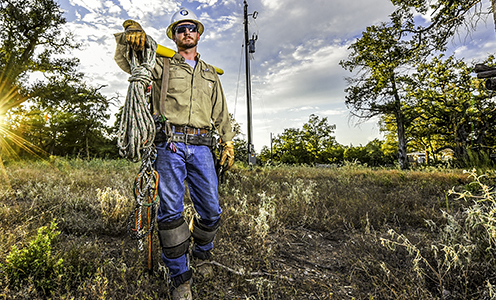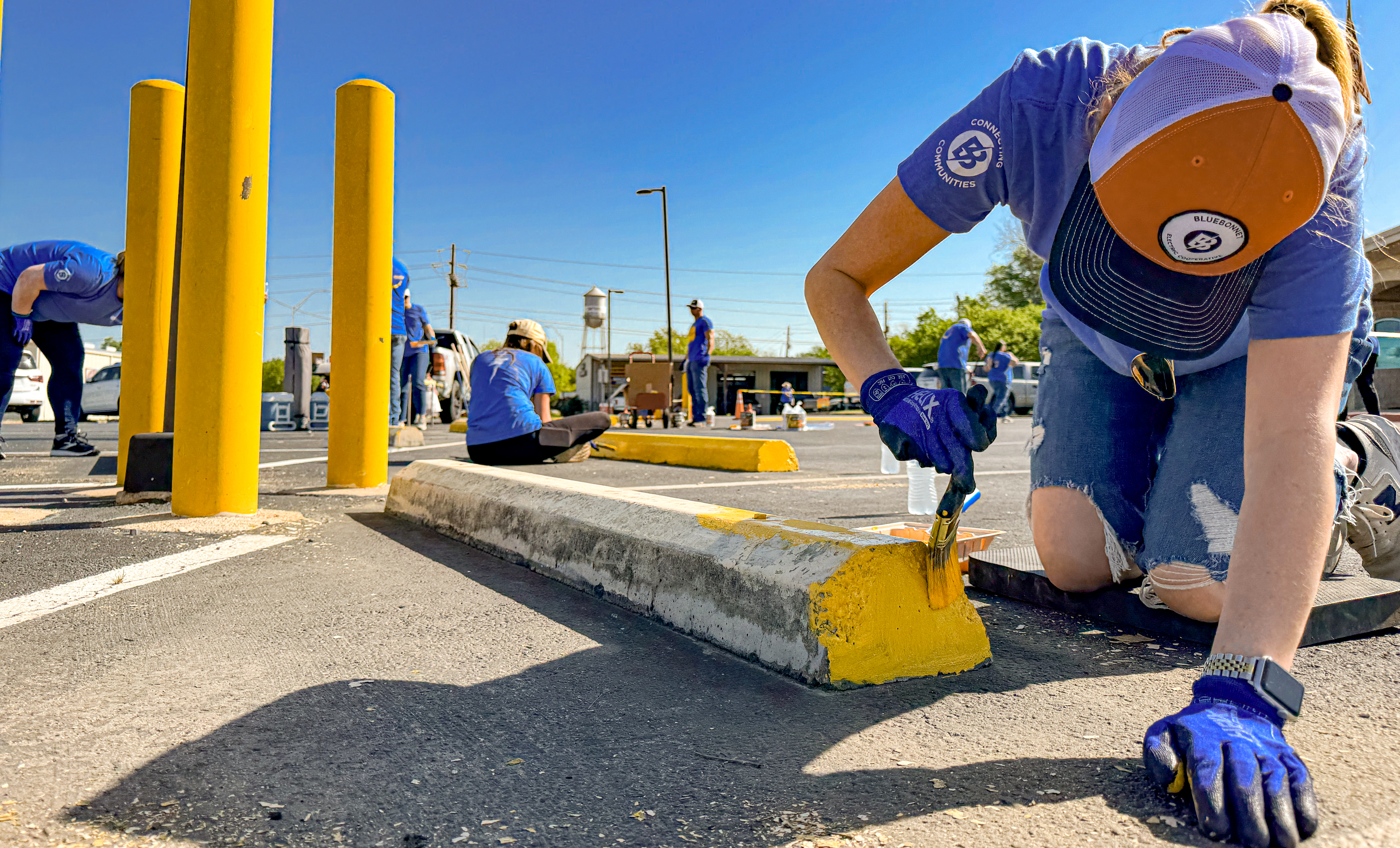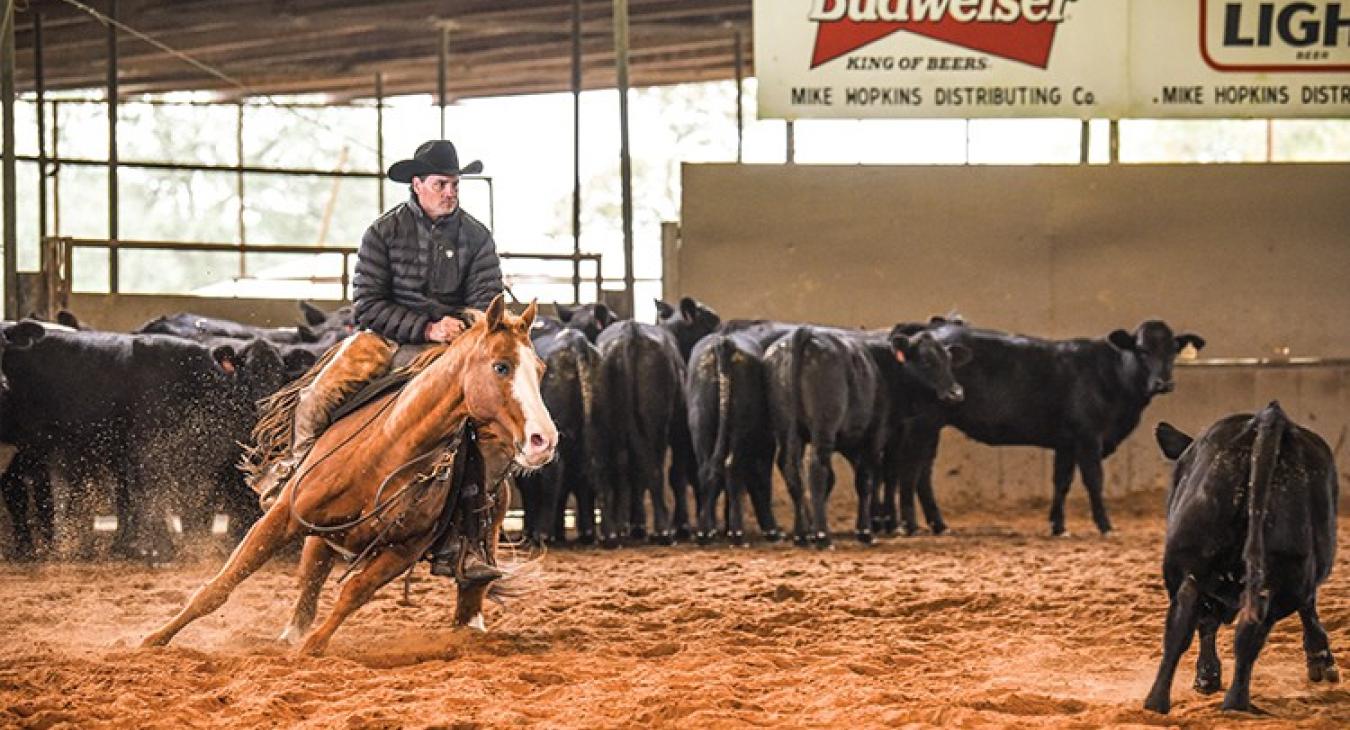What does it take to make a world champion ‘cutter’? Experience, dedication and a well-trained horse with cow sense.
What does it take to make a world champion ‘cutter’? Experience, dedication and a well-trained horse
By Pam LeBlanc
In a covered arena in Washington County, Constantine Caloudas and his horse Karlos kick up a cloud of dust as they separate a fidgety, rust-colored calf from a milling herd.
As the calf makes a break, the horse instinctively bows low and blocks its way. The calf tries to scramble back to the safety of the herd, but Karlos mirrors every move, keeping it on the run.
Caloudas, 53, a two-time world champion “cutter” owns the 75-acre Nueces Canyon Ranch west of Brenham. The ranch gets its electricity from Bluebonnet Electric Cooperative. Caloudas has been training and showing these finely tuned equine athletes for about 30 years. He compares riding a cutting horse to sitting atop a load of explosives.
“I’ve never felt anything like it,” he says after a 30-minute demonstration. “When you get on a 1,200-pound animal that’s doing its job and you’re just there for the ride, you can’t believe it. Think about straddling a 1,000-pound stick of dynamite with an extremely short fuse and you have no idea what’s fixing to happen next. Bottle that up in a two-and-a-half-minute ride. It’s amazing.”
The demo by Caloudas is mesmerizing. He hardly moves as the horse lurches side to side, doing one of those “break-down” moves that dogs execute when you wave a stick or a tennis ball at them.
Cutting traces its roots to the days of the open range, when cowboys periodically had to pull an animal from a herd to brand, castrate or treat it. Some horses were better at keeping a calf separated from the group than others, using what’s called “cow sense” to predict which direction the calf would try to run and countering its every move. The skill evolved into competition, and the first recorded cutting horse contest took place in 1898 in Haskell, Texas.
More than two decades later, the first cutting exhibition for a rodeo crowd was at the Fort Worth exposition and stock show in 1919.
Today, cutting horse competitors get a two-and-a-half minute “run” to show a judge how well their horse can cut a calf from a herd and keep it out. While subtle direction from the rider’s legs can make the critical difference between winning and losing in the sport, Caloudas gives most credit to the hoofed member of the team.
“It’s 90 percent the horse,” he says.
It’s a point he illustrates on a chilly November day by reaching forward and removing Karlos’ bridle. Caloudas sits quietly while the horse matches wits with another calf, staring it down, hopping when it hops, and refusing to let it rejoin its cow comrades.
What looks like amazing talent is typical cutting horse behavior, Caloudas says. “It’s not magic. It’s just two years of training.”
Caloudas was born in Dallas and raised in Houston. His father left his job as a commercial pilot to start a barbecue business in the Houston area. He sold the restaurant in the early 1980s and wanted to become a cowboy. The family moved to Brenham, where he opened a horse training facility in 1984.
While his dad learned the ropes, Caloudas played football and swam competitively in high school. He didn’t care much about equestrian sports. Then, during his final year studying business at Sam Houston State University in Huntsville, he realized he needed a long-term plan.
“Dad had this facility, and I said, ‘I’ll just train horses,’ ” Caloudas says.
His father chuckled at the idea. It was a stretch for his son, whose equestrian experience was a single summer visit to a dude ranch in eighth grade. But Caloudas, a natural athlete, started riding, and something clicked when he tried cutting. After three weeks, he entered his first competition and won it.
“Aspects of cutting are so mental,” he says. “If you’ve never ridden a cutting horse, it’s just an incredible feeling. You can’t believe the explosiveness, the power and strength, how the horse can move.”
Caloudas told his father that horse cutting seemed easy, and he’d like to pursue it. But a good cutting horse doesn’t come cheap. Caloudas borrowed $10,000 from the bank to buy his first horse and started competing in 1988. At 22, he was traveling the country competing. Within a few years, he won two world championships and has made it to the finals in numerous National Cutting Horse Association championships.
“It was a hell of a lot of fun,” he says. “It was just a great change. The cowboy life, it’s a blast.”
Caloudas later became a show promoter, hosting events at Nueces Canyon Ranch. Today he focuses mainly on training and showing horses. He’s learned that cutting requires lots of practice. A sign burned into the wood above his office desk at one end of the covered arena says, “Victory belongs to those who believe in it the most.”
“It takes two years to train an animal,” he says. “Some make it, some don’t. I can ride a horse and in six weeks know if it will make a good cutter.”
Training a horse to cut requires a supply of “fresh” calves never cut from a herd. (Once they’ve been through the ordeal, they wise up.) Because Nueces Canyon Ranch also preps calves for market, Caloudas can pick from a constantly rotating group. When a batch of calves arrives, Caloudas lets his horses match wits with them.
Only the best of the best become cutting horses. Horses that don’t measure up often are used for other rodeo events, like barrel racing or calf roping.
Caloudas also works with other riders, like veterinarian Bill Collier of Waller. Collier, who started competing in 2009, likens the sport to golf. “You can never master it, and when things go wrong it’s generally you,” he says.
Caloudas offers to let me ride Karlos to experience what it’s like to ride dynamite. It feels like I’m in the cockpit of a Ferrari. I barely twitch a muscle and Karlos moves.
I don’t have the skill to cut a calf from the herd, but I amble near the calves in one corner of the arena. One trots away, and I can feel Karlos ready to jump into action. I’m not a seasoned rider and only took riding lessons as a girl. I’m more comfortable on a bicycle than a rocketship of a horse.
My heels sink in the stirrups as I sit up. But for cutting, that’s not the right thing to do, Caloudas tells me. A slouch posture — “kind of like you’re hung over,” Caloudas says — is more appropriate. His son Dylan, who also works at the ranch, demonstrates perfectly, hunching in his saddle, prepared for any move the horse might make.
Cutters also brace one hand on the big horn of the large western saddle to keep from pitching forward if the horse slams on the brakes suddenly.
I may not know what I’m doing, but the horse does. When facing off against a pen of mooing cattle, it’s good to know who’s in charge.
I pat Karlos on the neck. We’ll let that calf relax for another day.
Download this story as it appeared in the Texas Co-op Power magazine »
Champion Cutting Horse 101
Constantine Caloudas, a world-champion cutting horse competitor, and Honey, his 6-year-old quarterhorse mare (official name W.R. This Cats Smooth) have won some $30,000 in prize money. (Over his career, Caloudas has won more than $600,000.) What does it take to create a winner? Here are some of his insights.
AGE: Cutting horses, typically quarter horses, usually begin to compete after age 3 and can remain competitive for some 12 to 14 years.
BRIDLE: Honey has a ‘shank correction’ bit, rather than the more common solid bit, to give Caloudas more lateral control. ‘She gets a little stiff in her front end,’ Caloudas said.
CHAPS: Lightweight leather made by Dave Hack from Idaho, these cost $2,500-$3,000, depending upon touches like fancy conchos.
BOOTS: For competition, Caloudas prefers ostrich-skin with a low ‘roper’ style heel.
BONES: A good cutting horse should generally be built low to the ground, a.k.a. ‘low hock,’ with a short back and good, strong bones so it is not injury-prone.
EXPRESSION: In competition, a horse should be ‘low-headed’ with good ‘expression’ or ‘eye appeal,’ meaning it is hyper-focused on the cow, as if reading its mind.
SHOES: Honey is shod in PLR-Wedge aluminum shoes because ‘she’s kind of flat-footed.’ Shoes are tailored to the horse. The mare is shod every six weeks by a farrier, a specialist in equine foot care. Shoes can be made from a variety of materials, including steel, rubber, plastic or titanium.
SADDLE: Vintage R.D. Monk saddles, which are no longer made, are Caloudas’ preference because they sit ‘closer to the horse.’ He owns 10 of them, which are 20-30 years old. They cost about $2,000-3,000; high-end name-brand saddles can cost up to $8,000.
SADDLE PAD: This is a wool ‘working pad,’ which absorbs sweat, but when competing, Caloudas says, he uses an Ecogold saddle pad made of a lightweight synthetic material. They cost about $300.
GASKINS: The large muscles immediately to the right and left of the tail are analogous to human calves. A good cutting horse has thick, powerful gaskins.
STIRRUPS: Caloudas prefers all-wood, 2-inch flat-bottomed stirrups. Other riders sometimes prefer aluminum or steel. Some riders prefer half-circle shaped stirrups, which can feel more secure. Caloudas considers them more dangerous because they’re harder to free your foot if you fall.
See this photo illustration as it appeared in the Texas Co-op Power magazine »
Competitive Cutting Horse FAQs
A cutting horse must be naturally athletic. Just as not everyone becomes a pro football or baseball player, not every horse is cut out for cutting. In addition to cat-like reflexes, flexibility and the ability to pivot on a dime, a cutting horse needs the right mentality. Good cutting horses are born with what cowboys call “cow sense” or “cow smarts.” Just like a good hunting dog can retrieve a bird and deliver it, a cutting horse understands what a cow or calf is thinking and where it’s going to move next. Then it can mirror those moves to keep the animal separated. About 99 percent of cutting horses are quarter horses.
How valuable is a cutting horse?
A good cutting horse can cost $25,000 to $35,000. Add another $25,000 or so for training. Breeding fees can top $25,000 for a good stud. “It’s not like golf. You can’t go to Walmart and spend a hundred dollars and if you don’t like it then throw the clubs into the pond,” Caloudas says.
What exactly does a cutting horse do?
A cutting horse works with a rider to separate a calf—typically a yearling weighing anywhere from 350 to 500 pounds—from a larger group of cattle. The horse positions itself between a calf and the herd, and mirrors its moves to prevent it from rejoining the group.
How is a cutting horse trained?
First, trainers have their horse follow a group of calves until the horse focuses on them. Next, they walk the horse parallel to a herd while moving around an arena. The horse gradually is guided closer to the cows, but still moving parallel to them. Eventually, when the rider asks the horse to stop at the front of the pack, the cows turn. A trainer then teaches a horse to follow a calf through its turn, so it’s facing the other direction. As the horse gains skill, the rider guides it to work a calf out of a herd and then practices those maneuvers. Some trainers use mechanical calves to assist in training.
What do cutting horse riders do with their legs and hands?
Probably not as much as you think. The rider places a hand on the front of the saddle horn to brace so when the horse bows down and mirrors a calf’s moves, the rider won’t be pitched off. Usually riders stay quiet on the horse, using their legs slightly to encourage the horse to move one way or the other if needed.
Where can the public watch cutting horse action?
Many National Cutting Horse Association events have been cancelled because of COVID-19, but the 2021 schedule includes the 3 Amigos and Senior World Tour events in Gonzales on Jan. 1-3, Jan. 15-17 and Jan 29-31, and the Jared Lesh Cutting event in Whitesboro on Jan. 21-23. Find information at nchacutting.com. The American Cutting Horse Association’s 2021 schedule includes competitions in Belton on Jan. 2-3 and Jan. 15-17, and in Brenham on Feb. 13-14 and March 20-21. Check for updates at: achacutting.org. Nueces Canyon Ranch also offers private group tours and demonstrations by appointment for a fee (barbecue included.) Find information at nuecescanyon.com.
View the PDF as it appeared in the Texas Co-op Power magazine »
See Constantine Caloudas in action.





